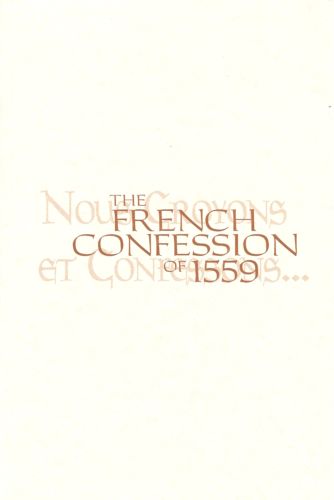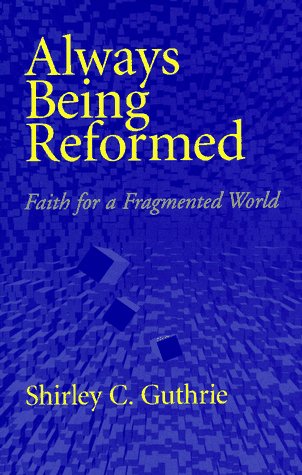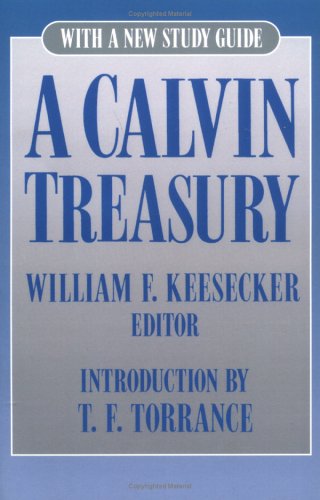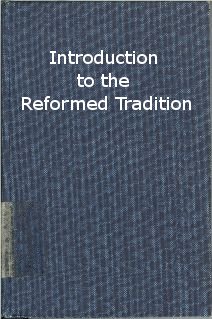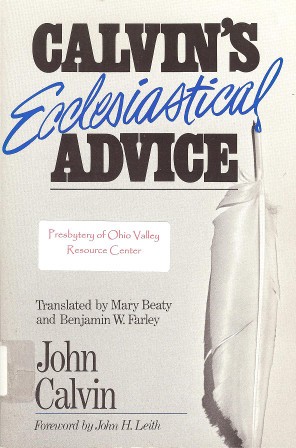Subject: Reformed Church – Doctrines
-
The French Confession of 1559
From the Preface: At the present time, when the Presbyterian Church (U.S.A.) must learn to live with the reality of its ‘cultural disestablishment,’ the French Confession is a helpful conversation partner. It is more than a mere historical curiosity, for although the French Confession is a product of 16th century Europe, it is neither out…
-
Calvin, Ecumenism And Justice
Both essays were given as addresses to the “International Consultation on the Impact of Calvin’s Social Thought in Reformed Witness.”
-
By John Calvin
Dr. Kerr, in his short biographical sketch, but mainly in his discriminating selection of Calvin’s letters, treatises, addresses, prayers and even a hymn, brings the religious genius of Geneva to life. Outstanding here is the very heart of Calvin’s legacy to Christendom: Institutes of the Christian Religion.
-
Always Being Reformed
Is it possible to maintain and defend Christian faithfulness and integrity in a pluralistic world without being arrogant, exclusive, intolerant, or irrelevant? Is it possible to be open to change, tolerant of difference, and relevant without compromising or sacrificing christian authenticity? Shirley Guthrie looks to the Reformed confessions to answer these questions. He asserts that…
-
Introducing The Reformed Faith
In this guide to the Reformed tradition, Donald McKim examines sixteen theological doctrines (for example, Scripture, Trinity, Sin, Person and Work of Christ, Church) and shows how the Reformed understanding of each contributes to the broader ecumenical family of Christian teachings. Each chapter gives the biblical basis for the doctrine, then traces its development through…
-
A Calvin Treasury
This book is a handy tool for pastors, theological students, and laity seeking a better understanding of the teaching of John Calvin. With the new study guide, it is a comprehensive, easy-to-read introduction to the most influential book of the Protestant Reformation: Calvin’s Institutes of the Christian Religion. The translation used is that of Ford…
-
Reformed Reader (Volume 1)
This excellent resource presents short, meaningful selections from major Reformed theologians of Europe, the British Isles, and America during the classical period of 1519-1799. Arranged thematically according to major doctrines, the book identifies significant theological points, illustrating both the distinctiveness and diversity of Reformed thought.
-
Reformed Reader (Volume 2)
This volume demonstrates a central conviction of the Reformed tradition – that theology must honor the historic witness of the church as catholic while being faithful to the new tasks of the present-day church. It offers selections from Reformed theology, creeds, confessions, and church documents of the nineteenth and twentieth centuries.
-
Calvin For Armchair Theologians
In this concise introduction to Calvin’s life and thought, Elwood offers an insightful and accessible overview of Calvin’s key teachings within his historical context. The trials and travails Calvin encountered as he ministered and taught in Geneva are given with special attention to theological controversies associated with the Trinity and predestination. Elwood indicates the ways…
-
Introduction To The Reformed Tradition
From the Preface: ‘This study of the Reformed tradition is motivated by gratitude for a heritage that has nurtured and shaped the writer’s own life and by the conviction that the tradition provides resources, clues, and inspiration for life in the last quarter of the twentieth century… The Reformed tradition has been one of the…
-
A Reading Of Calvin’s Institutes
‘Professor Reist provides us with a careful and fully documented account of the themes and the structure of the Institutes…. His years of living with Calvin’s writings are reflected in an ability to penetrate to the inner logic and development of the Reformer’s thought and effectively to counter many of the gross misunderstandings represented among…
-
Calvin’s Ecclesiastical Advice
In this collection of forty-six letters and writings of John Calvin, newly translated into English, the reformer gives advice to individuals and groups about theology, ethics, worship, politics, economics, and church practices. Topics discussed include dogmatics and polemics, changes (and the need for changes) in religion, the worship of images, ecclesiastical discipline, marriage, and justice. Specific…

